From August 3-11, the Biblical Language Center (BLC), in association with Fresno Pacific University, led a fluency workshop for instructors of New Testament Greek in Fresno, California. The effort to renew the speaking of New Testament Greek was the first of its kind in North America. To ensure the highest quality possible, the workshop was led by no less than five facilitators under Dr. Randall Buth’s leadership, allowing for much focused attention in small groups. Facilitators Jordash Kiffiak, Sharon Alley, Jason Weaver, Newton Trowbridge, along with myself and Randall Buth worked together to ensure the high level of energy necessary for the workshop’s full effectiveness. It also allowed us to capitalize on an often overlooked aspect of language and language learning, namely that it is a ‘team sport’, even when instructing. An enthusiastic group of 24 seminary, university, even Junior and High school instructors of Greek, as well as some aspiring to become instructors, came together for the seven and a half day of intensive immersion experience. Participants came from all over the United States, from New York to Texas to California, and were joined by a couple Bible Translators working in Nigeria and Tanzania.
The goal of the fluency workshop was to empower New Testament Greek instructors to use Communicative Language Teaching (CLT) techniques―for which speaking is foundational―since these are known to be significantly more efficient and effective than traditional methods. Furthermore, they lead to a higher proficiency in reading comprehension and better grasp of the language’s grammar. To accomplish that goal, the majority of the workshop used TPR (Total Physical Response), TPRS (Teaching Proficiency through Reading and Storytelling) and variations thereof, proven methodologies known to boost internalization of a language and its speaking.
It is hard to relate both the energy and the fun the group had, elements that were key in fostering maximized learning. Probably the best way to convey it is to let the participants say it in their own words.
On how much of a difference an eight-day workshop could make, one described it in this way:
“I find it useful that our ears get trained to listen and our brains need to respond instinctively rather than rolling through the paradigms. It really exercises our brain to access the appropriate information randomly at need. I have done a lot of language learning in my life and with each language there is always a mental line to be crossed – from passive understanding to active participation and generation of the language. Most of us resist that step, it feels unsafe, we feel stupid at first, but it is the only way to fluency. I feel that this workshop pushed me across that line in Greek. From here on Greek becomes my own language… I am now speaking Greek to my Greek students.”
Another commented,“My expectations were exceeded. I have been blown away by how much I’ve learned in these 8 days.”
Some participants came fully aware of the advantages of CLT and came eager to work on their speaking skills. One such participant relayed that “since I had studied with
Others came less sure of the feasibility of applying CLT to New Testament Greek. Here is how one such participant related her experience:
“I really wasn’t sure what to expect, and was anxious before I came… I came with many doubts and questions, simply because I had studied, tutored, taught in the traditional methods for so long – almost 30 years… Thanks to the humor, encouragement, kindness, patience and permission to make “30,000 mistakes,” the anxiety did not last long. Before I came, I had some doubts about what range of grammar could be covered by this method. I was amazed at how much we covered in just 7 days… I saw such potential for teaching in a way that would 1) help my students who struggle with the traditional methods; 2) help ALL my students to understand better, and retain longer; 3) transform learning Greek from a drudgery into a game, that I decided it was worth the effort and risk to change and try this.”
Another wrote that “the workshop changed my opinion on the role of spoken fluency for learning Koine Greek. Before coming to the workshop, I saw no practical value in learning Greek as a spoken language.” He returned to his institution and decided “to scrap 14 years of materials development” and make the switch to CLT: “I’m loving it and my students are loving it.”
As you can imagine, as organizers we could not have wished for a more successful workshop. We are overjoyed at the thought that the excitement we have experienced as we ourselves worked on our own fluency in Koine Greek, and the implications it has had (and continues to have) for our own reading and studying the New Testament, are now being passed on to others who are likewise passing it on to their students. For a first-of-its-kind workshop, we are so grateful that it was so successful. It should come as no surprise, therefore, that discussions are already under way about holding another one this coming summer (2012).


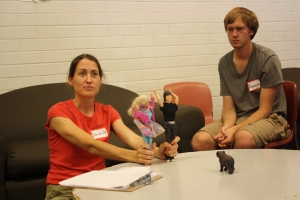
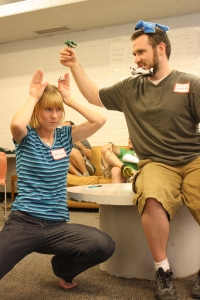
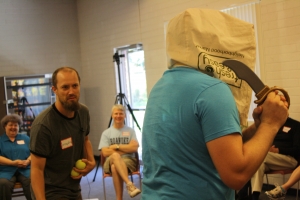
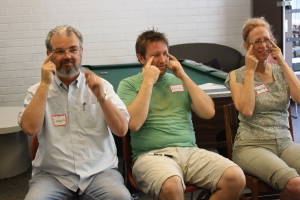
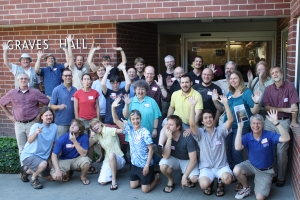
τί ἔλεγον οἱ μαθηταὶ περὶ τῆς βρώσεως?
ἡδεῖα ἦν ἡ βρῶσις
καὶ ἡ κοινωνία μετὰ φίλων νέων.
HELLO, A COUPLE OF MY FRIENDS STARTED USING MOUNCE 2 MONTHS AGO, AND JUST DISCOVERED WHAT YOU GUYS ARE DOING WITH THE LANGUAGE, I HAVE PURCHASE THE FIRST BOOK OF KOINE GREEK FROM YOU GUYS AND WE ARE VERY EXCITED ABOUT IT. WHEN WILL BE YOUR NEXT WORKSHOP? WILL YOU BE DOING A WINTER SESSION? WE ARE LEARNING SO THAT WE CAN EVENTUALLY TEACH IT.
Hi John;
There are two options for you. As a winter session, the BLC is running a “Jesus in Jerusalem” 10-day fluency program in Jerusalem. Check it out here. A second alternative is next summer when I hope to put on another fluency workshop for instructors of Greek. I am still finalizing plans for it, which is why there is no formal announcement yet. However, it is almost sure that the dates will be July 18-28, in Fresno, CA. In the meantime, allow me to encourage you with the following: at the initial stages (i.e. first few years) of learning Greek – or any language, one of the best things to do is to immerse yourself in listening to it – listening with comprehension and without the help of a written text in front of you. Living Koine Greek Book One is particularly good for that. Glad to hear you are interested in teaching Greek as a Living Language. That is exciting. Many blessings on your efforts.
[…] while back I wrote my own report on what transpired at this past summer’s Greek Workshop held in Fresno, […]
[…] while back I wrote my own report on what transpired at this past summer’s Greek Workshop held in August 2011 in Fresno, […]
[…] the 2011 Fresno Koine Greek Fluency Workshop, which I was unable to attend, a song that dealt with body parts was introduced to the […]
[…] a result of the BLC’s Koine Greek immersion programs, and especially the Workshop for Instructors this past summer in Fresno, CA, there has been growing interest in a song written and composed by […]
I am a third year Greek student. I am going through the series of picture books but I keep struggling with not pronouncing the words. I used to use Erasmean pronunciation and am switching to the “Buthian” method. It is as though I need to unlearn Greek and re-learn it while still using it!
I started reading a chapter of the NT in English and then reading it in Greek but that seems like it may be counterproductive since my goal is to learn Greek and not translate Greek into English. Any suggestions on making the change?
I am in the midwest and was wondering if there would ever be a weeklong seminar in someplace like Chicago if enough people were interested.
I am excited about learning spoken Κοινή and know that the effort, though from the starting line it looks like alot, will be more beneficail than three times as much effort using the traditional method.
Thank you.
Hi Mike; Thanks for your comments. First, about your “struggling with not pronouncing the words.” It is important for people to first listen to the new sounds a new language has, before trying to produce them. Hearing new distinctions in sounds not found in one’s own language is key to then be able to produce those distinctions oneself. Thus the instructions in the “picture book” to listen without speaking. However, there comes a point when the human brain simply and naturally wants to speak out what they have been hearing, just like a young child learning a language: after hearing it for a long time they naturally start speaking it (in small bits at first). It may be that as a third year Greek student, you are ready to start “speaking.” If that is the case, don’t struggle to hold yourself back – go ahead and pronounce the words. It may help to record yourself and play it back to yourself to see if what comes out of your mouth is similar to what you are hearing. Sounds funny to do such, but you would be amazed at how often what we think sounds the same out of our mouth is in fact quite different. Hearing it back to ourselves helps correct pronunciation.
Be encouraged. I too switched from a former pronunciation system to the “restored Koine,” and I didn’t find it that difficult. The key to do much listening. At the fluency workshop we just finished here in Fresno, most participants let us know that they wished they would have listened a lot more than what they did in preparation for the workshop. Listen, listen, listen. I would encourage getting the John CD from BLC and listening to that.
About your inquiry regarding a workshop in the Midwest. The idea has been floated, but at the very earliest it would be for 2013-14, if not after that. In the meantime, keep checking the website for announcements of workshop(s) for the coming academic year (2012-13).